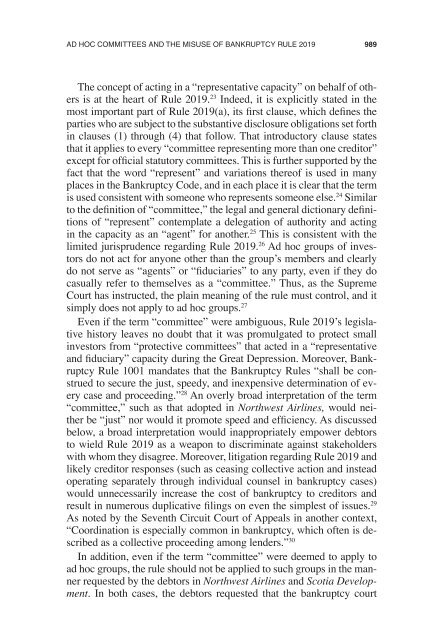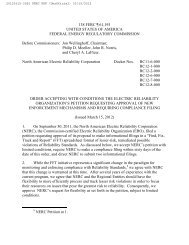Ad Hoc Committees and the Misuse of Bankruptcy Rule 2019
Ad Hoc Committees and the Misuse of Bankruptcy Rule 2019
Ad Hoc Committees and the Misuse of Bankruptcy Rule 2019
You also want an ePaper? Increase the reach of your titles
YUMPU automatically turns print PDFs into web optimized ePapers that Google loves.
<strong>Ad</strong> <strong>Hoc</strong> <strong>Committees</strong> <strong>and</strong> <strong>the</strong> <strong>Misuse</strong> <strong>of</strong> <strong>Bankruptcy</strong> <strong>Rule</strong> <strong>2019</strong> 989<br />
The concept <strong>of</strong> acting in a “representative capacity” on behalf <strong>of</strong> o<strong>the</strong>rs<br />
is at <strong>the</strong> heart <strong>of</strong> <strong>Rule</strong> <strong>2019</strong>. 23 Indeed, it is explicitly stated in <strong>the</strong><br />
most important part <strong>of</strong> <strong>Rule</strong> <strong>2019</strong>(a), its first clause, which defines <strong>the</strong><br />
parties who are subject to <strong>the</strong> substantive disclosure obligations set forth<br />
in clauses (1) through (4) that follow. That introductory clause states<br />
that it applies to every “committee representing more than one creditor”<br />
except for <strong>of</strong>ficial statutory committees. This is fur<strong>the</strong>r supported by <strong>the</strong><br />
fact that <strong>the</strong> word “represent” <strong>and</strong> variations <strong>the</strong>re<strong>of</strong> is used in many<br />
places in <strong>the</strong> <strong>Bankruptcy</strong> Code, <strong>and</strong> in each place it is clear that <strong>the</strong> term<br />
is used consistent with someone who represents someone else. 24 Similar<br />
to <strong>the</strong> definition <strong>of</strong> “committee,” <strong>the</strong> legal <strong>and</strong> general dictionary definitions<br />
<strong>of</strong> “represent” contemplate a delegation <strong>of</strong> authority <strong>and</strong> acting<br />
in <strong>the</strong> capacity as an “agent” for ano<strong>the</strong>r. 25 This is consistent with <strong>the</strong><br />
limited jurisprudence regarding <strong>Rule</strong> <strong>2019</strong>. 26 <strong>Ad</strong> hoc groups <strong>of</strong> investors<br />
do not act for anyone o<strong>the</strong>r than <strong>the</strong> group’s members <strong>and</strong> clearly<br />
do not serve as “agents” or “fiduciaries” to any party, even if <strong>the</strong>y do<br />
casually refer to <strong>the</strong>mselves as a “committee.” Thus, as <strong>the</strong> Supreme<br />
Court has instructed, <strong>the</strong> plain meaning <strong>of</strong> <strong>the</strong> rule must control, <strong>and</strong> it<br />
simply does not apply to ad hoc groups. 27<br />
Even if <strong>the</strong> term “committee” were ambiguous, <strong>Rule</strong> <strong>2019</strong>’s legislative<br />
history leaves no doubt that it was promulgated to protect small<br />
investors from “protective committees” that acted in a “representative<br />
<strong>and</strong> fiduciary” capacity during <strong>the</strong> Great Depression. Moreover, <strong>Bankruptcy</strong><br />
<strong>Rule</strong> 1001 m<strong>and</strong>ates that <strong>the</strong> <strong>Bankruptcy</strong> <strong>Rule</strong>s “shall be construed<br />
to secure <strong>the</strong> just, speedy, <strong>and</strong> inexpensive determination <strong>of</strong> every<br />
case <strong>and</strong> proceeding.” 28 An overly broad interpretation <strong>of</strong> <strong>the</strong> term<br />
“committee,” such as that adopted in Northwest Airlines, would nei<strong>the</strong>r<br />
be “just” nor would it promote speed <strong>and</strong> efficiency. As discussed<br />
below, a broad interpretation would inappropriately empower debtors<br />
to wield <strong>Rule</strong> <strong>2019</strong> as a weapon to discriminate against stakeholders<br />
with whom <strong>the</strong>y disagree. Moreover, litigation regarding <strong>Rule</strong> <strong>2019</strong> <strong>and</strong><br />
likely creditor responses (such as ceasing collective action <strong>and</strong> instead<br />
operating separately through individual counsel in bankruptcy cases)<br />
would unnecessarily increase <strong>the</strong> cost <strong>of</strong> bankruptcy to creditors <strong>and</strong><br />
result in numerous duplicative filings on even <strong>the</strong> simplest <strong>of</strong> issues. 29<br />
As noted by <strong>the</strong> Seventh Circuit Court <strong>of</strong> Appeals in ano<strong>the</strong>r context,<br />
“Coordination is especially common in bankruptcy, which <strong>of</strong>ten is described<br />
as a collective proceeding among lenders.” 30<br />
In addition, even if <strong>the</strong> term “committee” were deemed to apply to<br />
ad hoc groups, <strong>the</strong> rule should not be applied to such groups in <strong>the</strong> manner<br />
requested by <strong>the</strong> debtors in Northwest Airlines <strong>and</strong> Scotia Development.<br />
In both cases, <strong>the</strong> debtors requested that <strong>the</strong> bankruptcy court



